HR Coordinators are fundamental in shaping the workforce of a company. They bridge the gap between management and employees, ensuring that both sides are aligned and that organizational policies are understood and implemented effectively.
Key skills for an HR Coordinator include strong interpersonal and communication abilities, proficiency in HR software, and a solid understanding of employment laws. Additionally, they must be adept at problem-solving and organizing.
Candidates can write these abilities in their resumes, but you can’t verify them without on-the-job HR Coordinator skill tests.
In this post, we will explore 9 essential HR Coordinator skills, 11 secondary skills and how to assess them so you can make informed hiring decisions.
Table of contents
9 fundamental HR Coordinator skills and traits
The best skills for HR Coordinators include Communication, Organizational Skills, Attention to Detail, Problem-Solving, Time Management, Technical Proficiency, Interpersonal Skills, Compliance Knowledge and Data Analysis.
Let’s dive into the details by examining the 9 essential skills of a HR Coordinator.
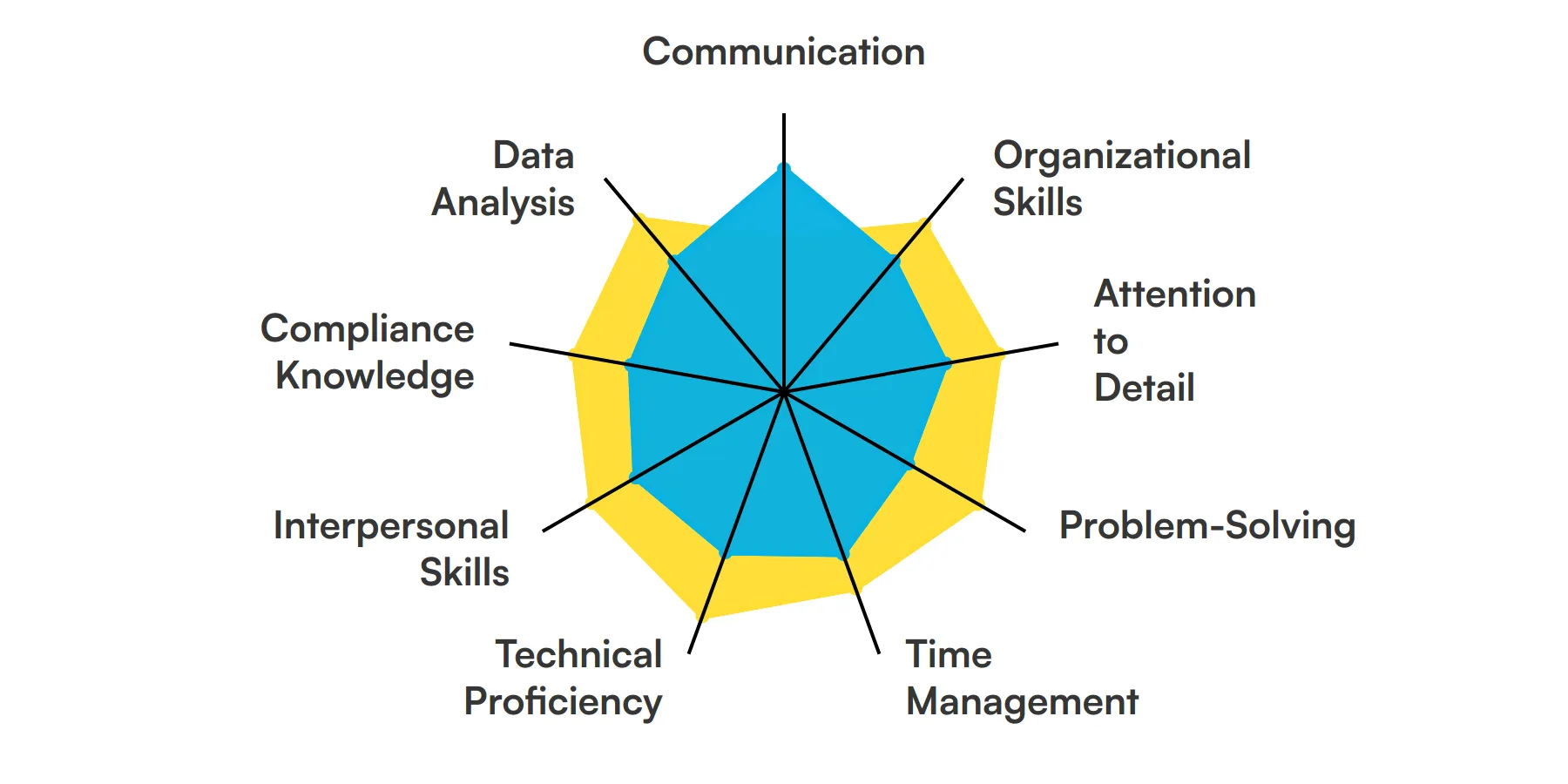
Communication
An HR Coordinator must excel in both verbal and written communication. This skill is crucial for drafting emails, conducting interviews, and explaining company policies to employees. Clear communication ensures that everyone is on the same page and helps in resolving conflicts effectively.
Organizational Skills
Managing multiple tasks, schedules, and deadlines is a daily part of an HR Coordinator's role. Strong organizational skills help in keeping track of employee records, coordinating events, and ensuring that all HR processes run smoothly.
Attention to Detail
Accuracy is key when handling employee data, payroll, and compliance documents. Attention to detail helps in minimizing errors and ensures that all records are up-to-date and accurate, which is essential for legal and operational reasons.
Check out our guide for a comprehensive list of interview questions.
Problem-Solving
HR Coordinators often face unexpected challenges, from resolving employee disputes to managing last-minute schedule changes. Strong problem-solving skills enable them to find effective solutions quickly, ensuring minimal disruption to the workplace.
Time Management
Balancing various responsibilities such as recruitment, onboarding, and employee relations requires excellent time management. This skill helps HR Coordinators prioritize tasks and meet deadlines, ensuring that all HR functions are performed efficiently.
Technical Proficiency
Familiarity with HR software and tools is essential for managing employee records, payroll, and benefits. Technical proficiency allows HR Coordinators to streamline processes and improve overall efficiency in the HR department.
Interpersonal Skills
Building strong relationships with employees and management is a key part of an HR Coordinator's role. Interpersonal skills help in creating a positive work environment and fostering open communication, which is vital for employee satisfaction and retention.
Compliance Knowledge
Understanding labor laws and company policies is crucial for ensuring that the organization remains compliant. This knowledge helps HR Coordinators navigate legal requirements and avoid potential legal issues.
Data Analysis
Analyzing HR metrics and data helps in making informed decisions about hiring, training, and employee retention. Data analysis skills enable HR Coordinators to identify trends and areas for improvement, contributing to the overall success of the HR department.
For more insights, check out our guide to writing a Data Analyst Job Description.
11 secondary HR Coordinator skills and traits
The best skills for HR Coordinators include Conflict Resolution, Multitasking, Confidentiality, Adaptability, Customer Service, Project Management, Negotiation, Training and Development, Event Coordination, Budgeting and Presentation Skills.
Let’s dive into the details by examining the 11 secondary skills of a HR Coordinator.
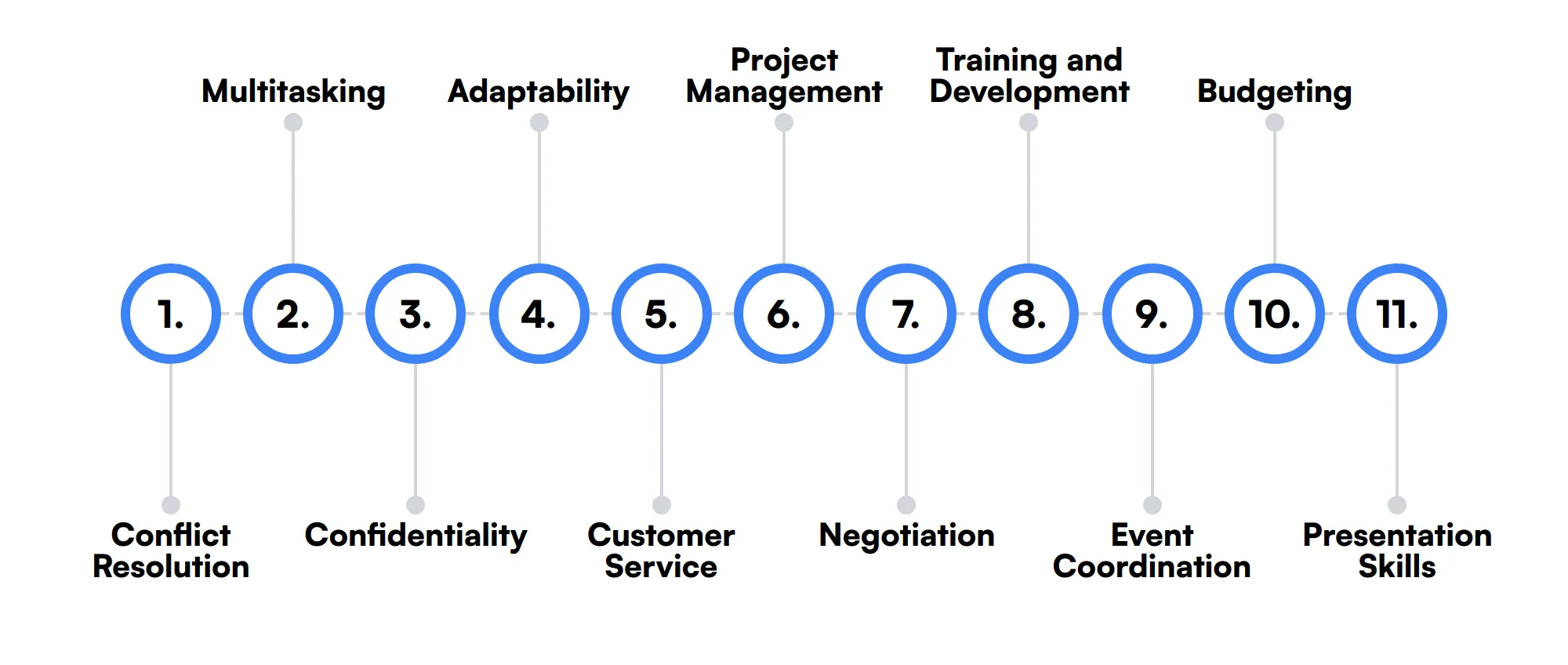
Conflict Resolution
Handling disputes and conflicts in the workplace is a common task for HR Coordinators. Conflict resolution skills help in mediating disagreements and finding mutually acceptable solutions, maintaining a harmonious work environment.
Multitasking
Juggling various responsibilities such as recruitment, employee relations, and administrative tasks requires the ability to multitask. This skill ensures that all tasks are completed efficiently without compromising on quality.
Confidentiality
HR Coordinators handle sensitive information such as employee records and salary details. Maintaining confidentiality is crucial to protect employee privacy and ensure trust within the organization.
Adaptability
The HR landscape is constantly evolving, and HR Coordinators must be adaptable to changes in policies, technologies, and workforce dynamics. Adaptability helps in staying current and effectively managing new challenges.
Customer Service
Providing excellent support to employees and addressing their concerns promptly is an important aspect of the HR Coordinator role. Customer service skills help in creating a positive experience for employees, enhancing overall satisfaction.
Project Management
Managing HR projects such as training programs, employee engagement initiatives, and policy updates requires strong project management skills. This ensures that projects are completed on time and within budget.
Negotiation
Negotiating terms with vendors, contractors, and even employees is sometimes necessary. Negotiation skills help HR Coordinators secure favorable terms and agreements, benefiting the organization.
Training and Development
Facilitating employee training and development programs is a key responsibility. This skill helps in identifying training needs, organizing sessions, and ensuring that employees have the resources they need to grow.
Event Coordination
Organizing company events, from team-building activities to corporate meetings, requires strong event coordination skills. This ensures that events run smoothly and achieve their intended objectives.
Budgeting
Managing the HR budget, including expenses for recruitment, training, and employee benefits, requires budgeting skills. This helps in ensuring that resources are allocated efficiently and financial goals are met.
Presentation Skills
Presenting information to employees, management, or during training sessions is a common task. Strong presentation skills help in conveying information clearly and engagingly, ensuring that the audience understands and retains the information.
How to assess HR Coordinator skills and traits
Assessing the skills and traits of an HR Coordinator involves more than just glancing at a resume. It requires a deep dive into their capabilities in areas such as communication, organizational skills, and compliance knowledge. Understanding how well a candidate can manage time, solve problems, and analyze data is key to predicting their success in the role.
Traditional interviews often fall short in accurately gauging these competencies. This is where skills assessments come into play. By using targeted tests, you can measure a candidate's abilities in real-world scenarios. For HR Coordinators, this might include simulations that assess interpersonal skills or tasks that evaluate their technical proficiency.
Adaface assessments offer a streamlined approach to evaluating the multifaceted skills of HR Coordinators. With tests designed to reflect actual job tasks, you can ensure that your candidates are not only proficient in theory but also in practice. Adaface tests have been shown to reduce screening time by 85%, making them a valuable tool in the hiring process.
Let’s look at how to assess HR Coordinator skills with these 6 talent assessments.
Communication Skills Test
The Communication Skills Test evaluates candidates' communication skills, including verbal and written communication, active listening, and interpersonal skills. It assesses their ability to effectively communicate with customers, colleagues, and stakeholders in various professional scenarios.
The test covers communication skills, situational judgement, attention to detail, critical thinking, and verbal reasoning. Candidates navigate through situational judgement questions, communication skills scenarios, and critical thinking exercises to demonstrate their proficiency.
Successful candidates show strong verbal and written communication, active listening, and the ability to handle professional scenarios effectively. They also exhibit critical thinking and attention to detail.
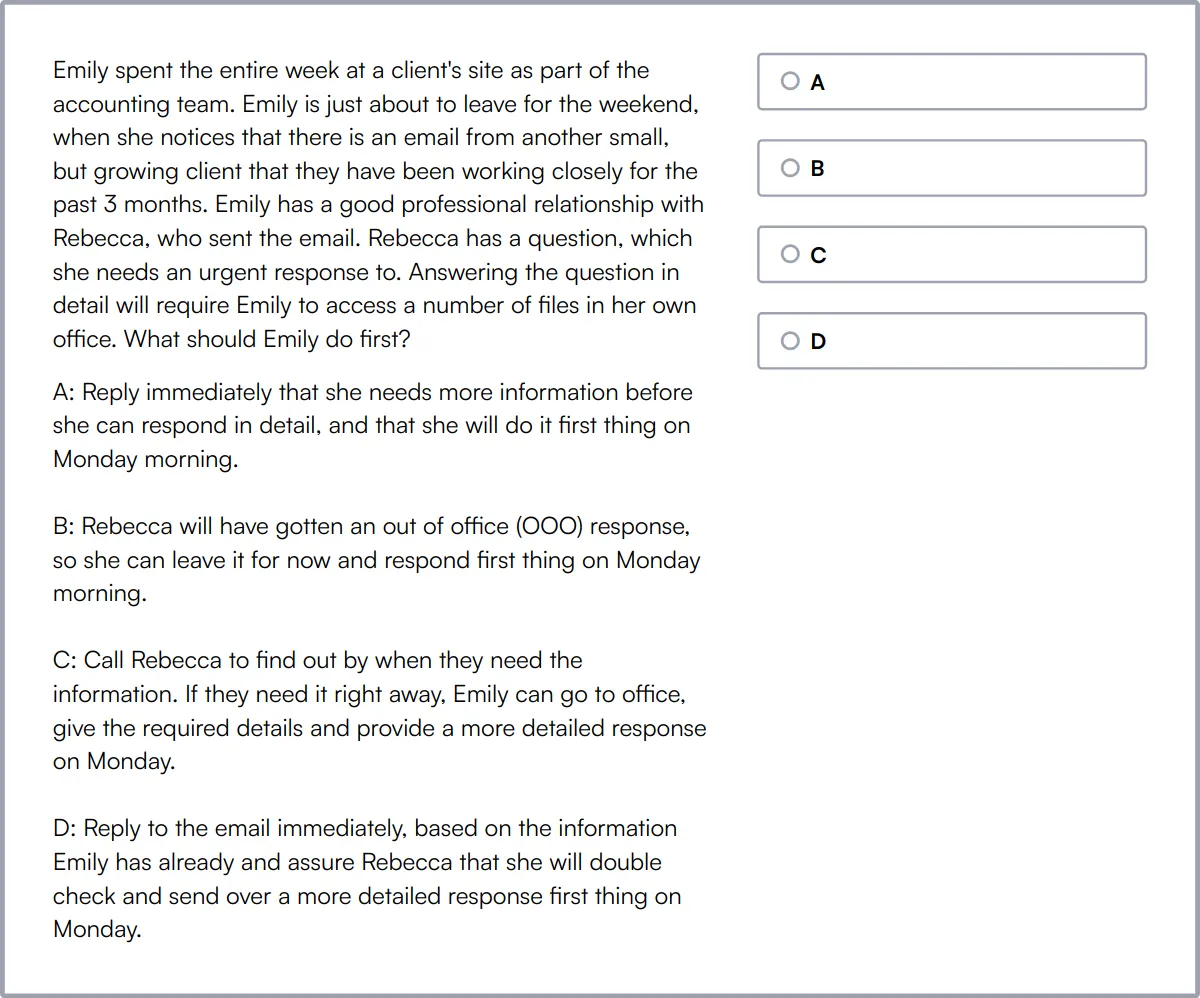
Administrative Assistant Test
The Administrative Assistant Test is a comprehensive assessment designed to evaluate a candidate's skills and aptitude for the role of an administrative assistant. It encompasses various aspects crucial to this role, such as organizational skills, time management, communication skills, and attention to detail.
The test assesses organizational skills, time management, communication skills, problem-solving skills, and attention to detail. Candidates handle scenario-based questions to demonstrate their ability to manage schedules, handle correspondence, and deal with confidential information.
High-scoring candidates excel in managing schedules, handling correspondence, and maintaining confidentiality. They also show strong organizational and time management skills.
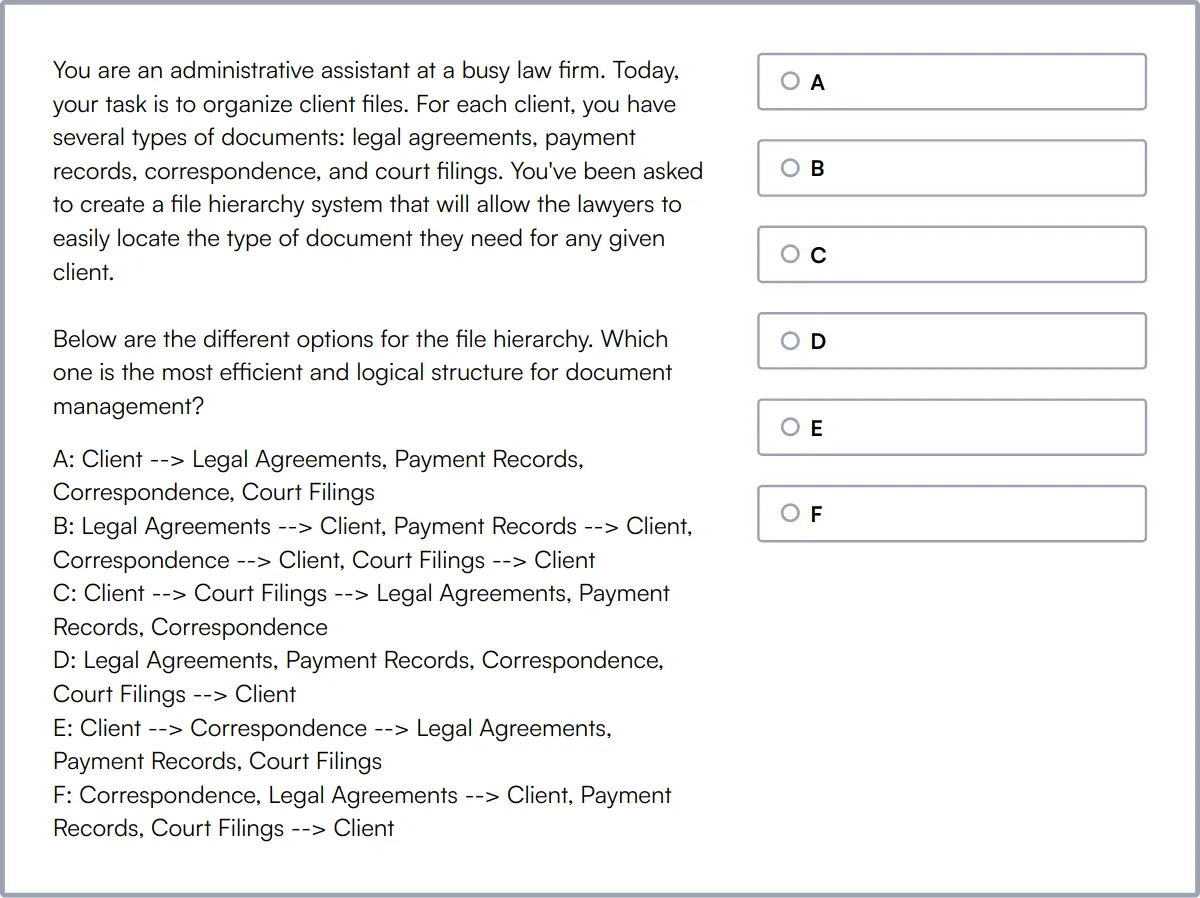
Attention To Detail Test
The Attention to Detail Test evaluates a candidate's ability to focus on tasks and their willingness to be thorough for detail-oriented work. It helps identify candidates who pay attention to detail while processing information and ensure high-quality work.
The test covers following instructions, verifying data, checking consistency, proof-reading, identifying mistakes, and detecting typos. Candidates demonstrate their ability to spot errors and maintain accuracy in various tasks.
Successful candidates show a keen eye for detail, ensuring accuracy and consistency in their work. They excel in identifying mistakes and verifying data.
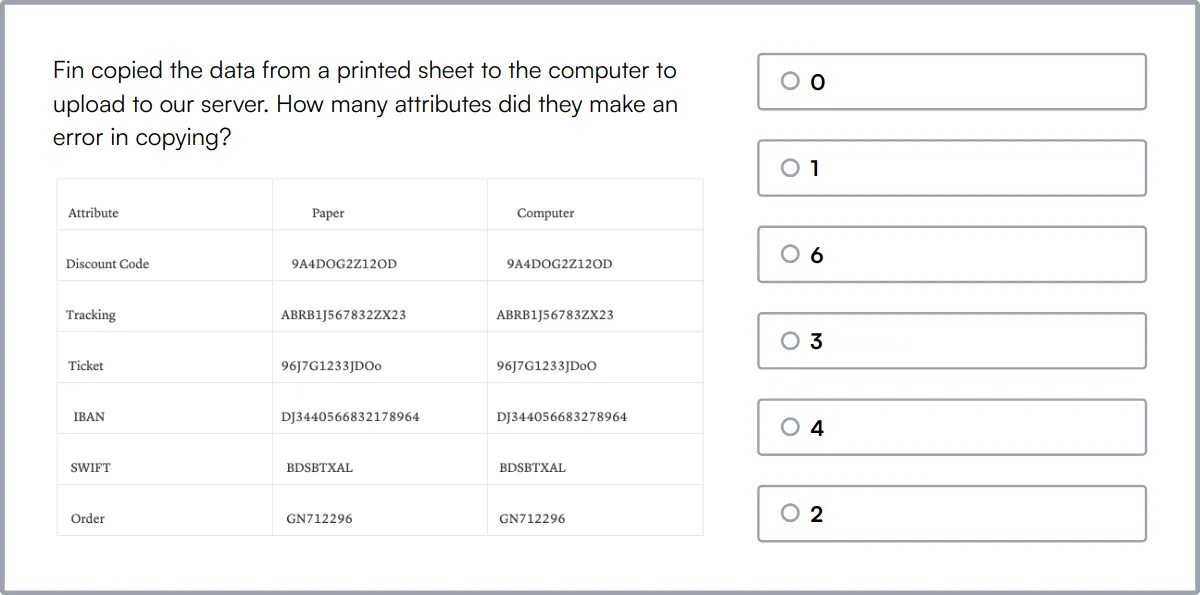
Problem Solving Test
The Problem Solving Test evaluates a candidate's ability to understand instructions, analyze data, and respond to complex problems or situations. It provides insights into their problem-solving, learning agility, and coachability.
The test covers abstract reasoning, critical thinking, deductive reasoning, inductive reasoning, pattern matching, and spatial reasoning. Candidates navigate through logical reasoning, data interpretation, and spatial reasoning questions to demonstrate their problem-solving skills.
High-scoring candidates exhibit strong analytical skills, critical thinking, and the ability to solve complex problems. They also show proficiency in abstract and spatial reasoning.
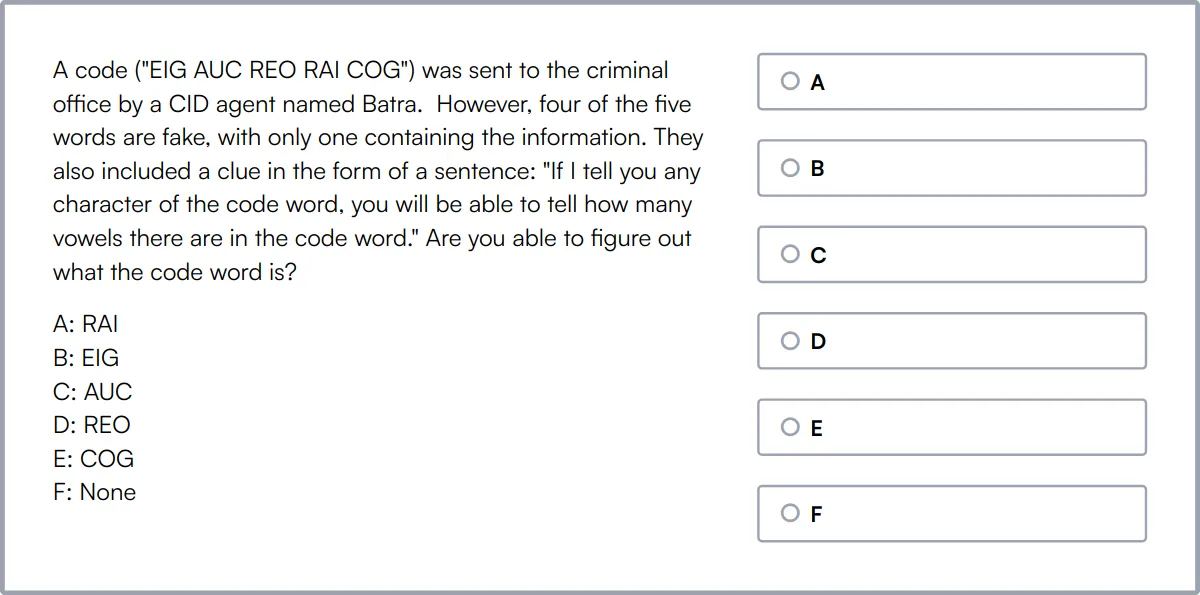
Basic Computer Skills Test
The Basic Computer Skills Test evaluates a candidate's knowledge of fundamental computer skills, including data entry, Excel, typing, and system administration.
The test covers basic computer skills, data entry, Excel, typing, and system administration. Candidates demonstrate their proficiency in using office software and handling basic computer tasks.
Successful candidates show strong proficiency in data entry, Excel, and typing. They also exhibit a good understanding of system administration and basic computer operations.
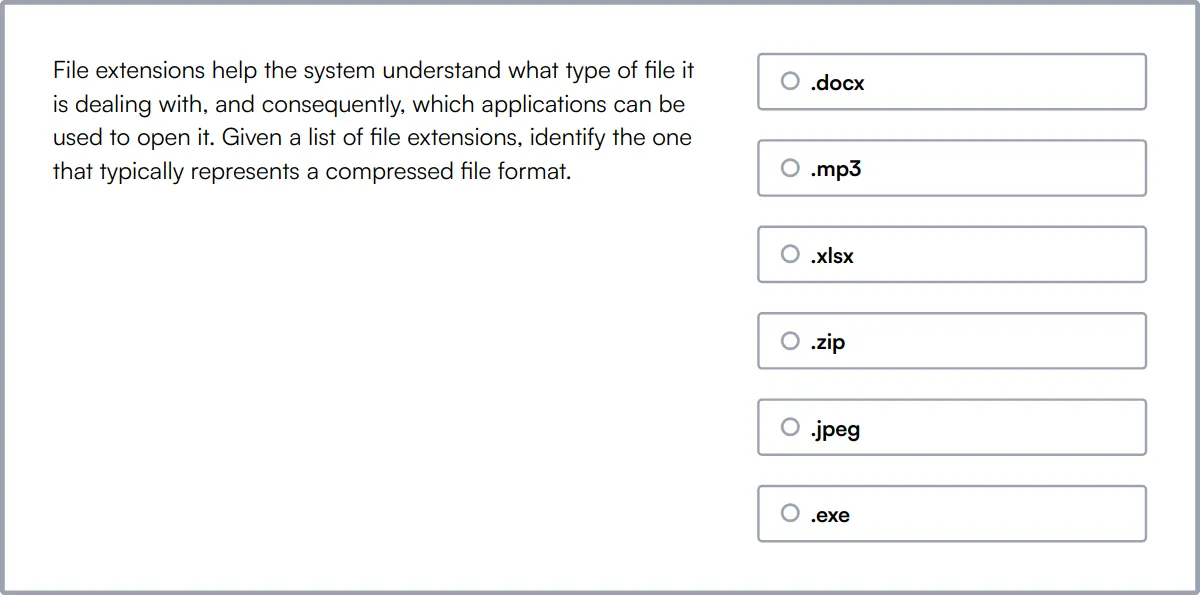
Customer Service Aptitude Test
The Customer Service Aptitude Test evaluates a candidate's skills in customer service, attention to detail, problem-solving, verbal reasoning, numerical reasoning, and logical reasoning.
The test covers customer service, attention to detail, verbal reasoning, numerical reasoning, logical reasoning, and communication skills. Candidates navigate through customer service scenarios, situational judgement questions, and reasoning exercises to demonstrate their aptitude.
High-scoring candidates excel in customer service, showing strong communication skills and attention to detail. They also demonstrate proficiency in verbal, numerical, and logical reasoning.
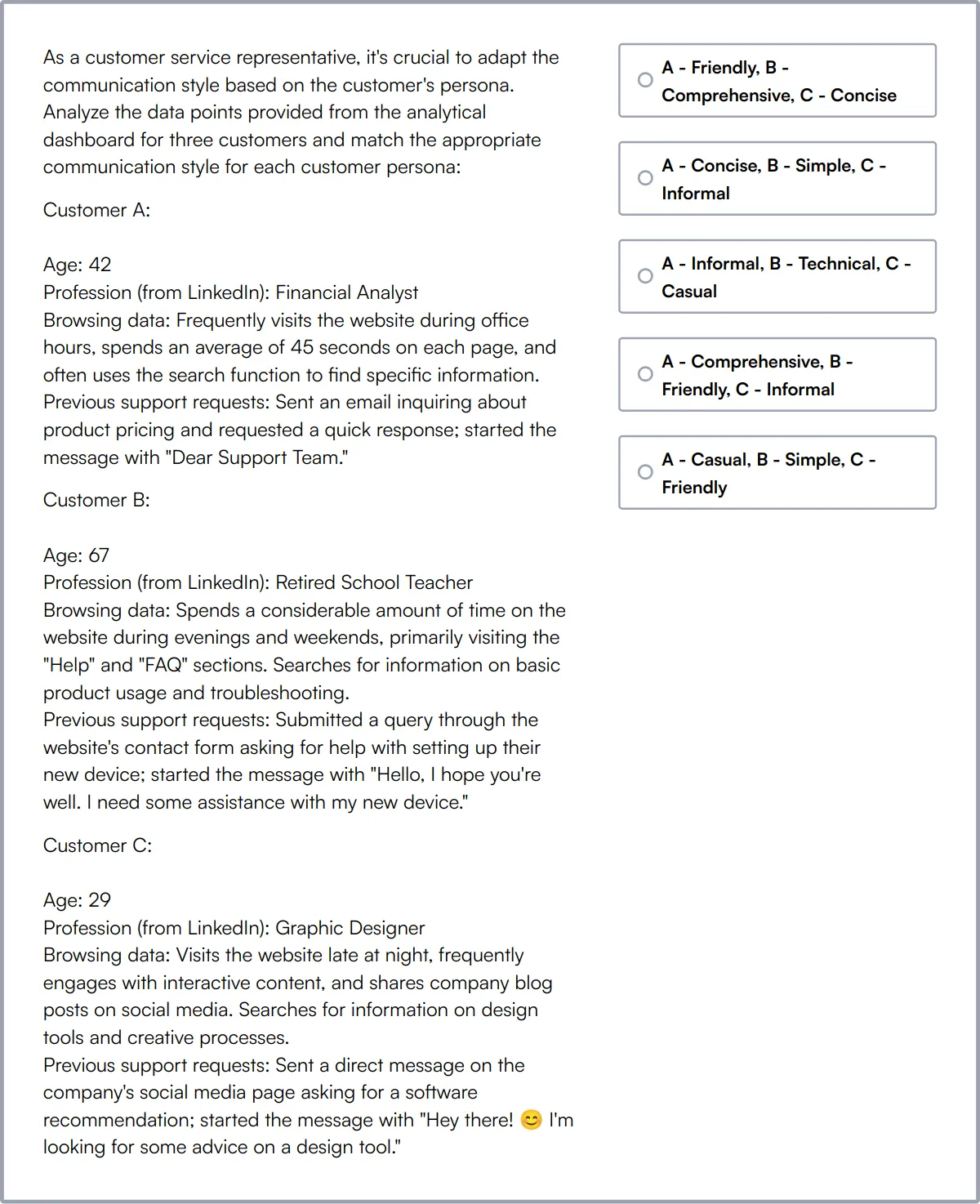
Summary: The 9 key HR Coordinator skills and how to test for them
| HR Coordinator skill | How to assess them |
|---|---|
| 1. Communication | Evaluate clarity and effectiveness in verbal and written exchanges. |
| 2. Organizational Skills | Check ability to manage multiple tasks and maintain order. |
| 3. Attention to Detail | Assess accuracy in documentation and data entry. |
| 4. Problem-Solving | Observe approach to identifying and resolving issues. |
| 5. Time Management | Measure ability to prioritize tasks and meet deadlines. |
| 6. Technical Proficiency | Test familiarity with HR software and tools. |
| 7. Interpersonal Skills | Gauge ability to build and maintain professional relationships. |
| 8. Compliance Knowledge | Verify understanding of labor laws and regulations. |
| 9. Data Analysis | Evaluate capability to interpret and utilize HR data. |
Talent Acquisition Test
HR Coordinator skills FAQs
How can I assess an HR Coordinator's communication skills?
Evaluate their ability to articulate thoughts clearly during interviews. Review their written communication, such as emails or reports, for clarity and professionalism.
What are effective ways to test organizational skills in HR Coordinator candidates?
Ask candidates to describe how they manage multiple tasks and deadlines. Consider giving them a practical task to organize, such as scheduling a series of interviews.
How do I gauge an HR Coordinator's attention to detail?
Include tasks in the interview process that require precision, such as reviewing a document for errors. Ask about their methods for ensuring accuracy in their work.
What questions can reveal an HR Coordinator's problem-solving abilities?
Pose hypothetical HR scenarios and ask how they would handle them. Look for logical, practical solutions and their ability to think on their feet.
How can I assess time management skills in an HR Coordinator?
Inquire about their strategies for prioritizing tasks and meeting deadlines. Request examples of how they have managed their time in previous roles.
What technical skills should an HR Coordinator have, and how can I test them?
They should be proficient in HR software and Microsoft Office. Test their skills with practical tasks, like creating a spreadsheet or navigating HR software.
How do I evaluate an HR Coordinator's interpersonal skills?
Observe their interactions during the interview process. Ask about their experience working in teams and handling difficult conversations.
What methods can be used to assess an HR Coordinator's compliance knowledge?
Ask about their understanding of labor laws and HR policies. Consider giving them a compliance-related scenario to see how they would ensure adherence to regulations.

40 min skill tests.
No trick questions.
Accurate shortlisting.
We make it easy for you to find the best candidates in your pipeline with a 40 min skills test.
Try for freeRelated posts
Free resources



